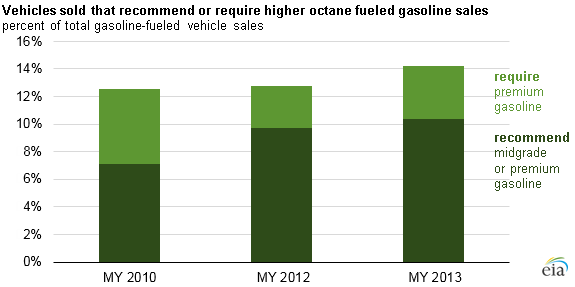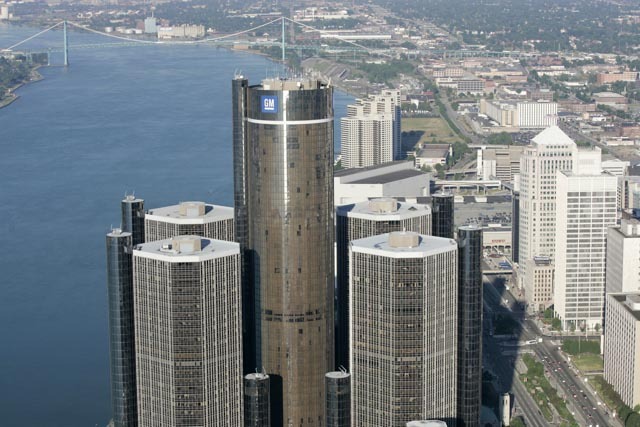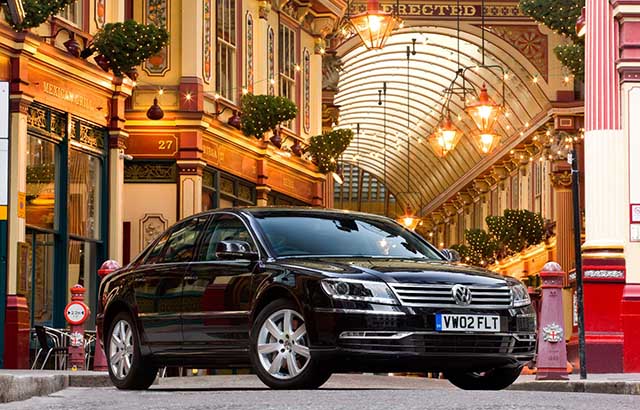Search the Community
Showing results for tags 'Spending'.
-

How We Are Spending More and Less at the Gas Pump
William Maley posted an article in Automotive Industry
The good news is that consumers are visiting the gas station less. The bad news is that consumers are spending more at the pump. Wait, those two sentences contradict each other. Which one is true? According to the Energy Information Administration (EIA), both of these sentences are correct. Let us explain. As new fuel economy and emission regulations come into effect, automakers are trying to figure out ways to make that gallon of gas go farther. One method that a number of automakers are using is turbochargers. They allow automakers to use smaller displacement engines to improve fuel economy and retain the power of larger engines. The EIA says the market share of turbo engines has climbed from 3.3 percent in 2009 to 17.6 percent in 2014. But the problem is that many turbo engines require premium fuel to operate at their full potential, which costs more than regular and midgrade fuel. Yes, you can fill them with regular and not have the issue of knock - premature fuel detonation due to increased cylinder pressure. But you lose some of the power that the turbo is providing. The EIA says that only 12.5 percent of vehicles recommended premium fuel in 2010. This increased to 14.2 percent in 2013. With turbo engines projected to be in 83.3 percent of new vehicles by 2025, expect to pay more at the pump despite going there less. Source: Energy Information Administration -
The good news is that consumers are visiting the gas station less. The bad news is that consumers are spending more at the pump. Wait, those two sentences contradict each other. Which one is true? According to the Energy Information Administration (EIA), both of these sentences are correct. Let us explain. As new fuel economy and emission regulations come into effect, automakers are trying to figure out ways to make that gallon of gas go farther. One method that a number of automakers are using is turbochargers. They allow automakers to use smaller displacement engines to improve fuel economy and retain the power of larger engines. The EIA says the market share of turbo engines has climbed from 3.3 percent in 2009 to 17.6 percent in 2014. But the problem is that many turbo engines require premium fuel to operate at their full potential, which costs more than regular and midgrade fuel. Yes, you can fill them with regular and not have the issue of knock - premature fuel detonation due to increased cylinder pressure. But you lose some of the power that the turbo is providing. The EIA says that only 12.5 percent of vehicles recommended premium fuel in 2010. This increased to 14.2 percent in 2013. With turbo engines projected to be in 83.3 percent of new vehicles by 2025, expect to pay more at the pump despite going there less. Source: Energy Information Administration View full article
-
General Motors is rethinking its approach in the automotive marketplace. A number of conflicting issues (auto sales growth are slowing, stricter standards for emissions and safety; autonomous vehicles, changes in how vehicles are owned, and trying to return more cash to stockholders) have the company making some drastic changes in an effort to cut captial spending. Speaking with Reuters, a number of GM executives said they are undertaking the most extensive overhaul of its vehicle development process in many years. The end goal is to design their global lineup with a few building blocks and spreading the costs of engineering and research over many more vehicles. Also, GM plans on doubling the life of their platforms. GM President Dan Ammann said the basic platform of their vehicles "could last a dozen years or more." This move will begin with the next-generation Chevrolet Cruze. GM plans on changing the exterior styling more often and updating electronics with updates from the internet. But this new strategy brings a lot of risks. First, GM will be increasing its capital spending from $7 billion in 2014 to $9 billion in 2019. This is so GM can prepare for this change in strategy with investments in various facilities. There is also the danger of the platforms being outdated or products that aren't appealing customers in different global markets. “The advantage could be short-lived,” said Jeff Schuster, senior vice president at LMC Automotive. Source: Reuters
- 16 comments
-
- General Motors
- Longer Timeframe
- (and 4 more)
-
General Motors is rethinking its approach in the automotive marketplace. A number of conflicting issues (auto sales growth are slowing, stricter standards for emissions and safety; autonomous vehicles, changes in how vehicles are owned, and trying to return more cash to stockholders) have the company making some drastic changes in an effort to cut captial spending. Speaking with Reuters, a number of GM executives said they are undertaking the most extensive overhaul of its vehicle development process in many years. The end goal is to design their global lineup with a few building blocks and spreading the costs of engineering and research over many more vehicles. Also, GM plans on doubling the life of their platforms. GM President Dan Ammann said the basic platform of their vehicles "could last a dozen years or more." This move will begin with the next-generation Chevrolet Cruze. GM plans on changing the exterior styling more often and updating electronics with updates from the internet. But this new strategy brings a lot of risks. First, GM will be increasing its capital spending from $7 billion in 2014 to $9 billion in 2019. This is so GM can prepare for this change in strategy with investments in various facilities. There is also the danger of the platforms being outdated or products that aren't appealing customers in different global markets. “The advantage could be short-lived,” said Jeff Schuster, senior vice president at LMC Automotive. Source: Reuters View full article
- 16 replies
-
- General Motors
- Longer Timeframe
- (and 4 more)
-
Volkswagen is making some big changes for the future. In a statement released today, the company announced that it would cut 1 Billion Euros (about $1.1 billion) in investments. The statement didn't say would be part of the cuts. Volkswagen also announced that it would be fitting diesel models sold in Europe and U.S. with SCR and AdBlue technology 'as soon as possible'. Further down in the statement, Volkswagen announced that it would put more of a focus on battery and plug-in powertrains for its MQB architecture (what underpins the Golf and the upcoming Tiguan. Along with this, the company is working on a new modular electric “toolkit” that could deliver around 155 to 300 Miles on a charge. Volkswagen has also given a preview of what's in store for the next Phaeton. The statement talks about a specification of the model that will feature a pure electric drive. "The Volkswagen brand is repositioning itself for the future. We are becoming more efficient, we are giving our product range and our core technologies a new focus, and we are creating room for forward-looking technologies by speeding up the efficiency program," said Volkswagen brand chief Herbert Diess. Source: Volkswagen Press Release is on Page 2 Volkswagen Brand Board of Management takes strategic decisions Accelerated implementation of the efficiency program creates room for reorientation Streamlined processes leverage further cost-saving potential, including cuts in fixed costsInvestments to be reduced by 1 billion euros per year compared with planning – combined with prioritization of projects for the future Product decisions formulatedNew Phaeton will be electric New Modular Electric Toolkit planned The newly-formed Volkswagen Brand Board of Management took further strategic decisions at a special meeting. CEO Dr. Herbert Diess announced major product decisions: a reorientation of the diesel strategy with the most advanced technologies, the development of a standardized electric architecture for passenger cars and light commercial vehicles, and a new approach for the next generation of the Phaeton. Investments are to be reduced by some one billion euros per year, the efficiency program is to be accelerated. Dr. Herbert Diess underscored: "The Volkswagen brand is repositioning itself for the future. We are becoming more efficient, we are giving our product range and our core technologies a new focus, and we are creating room for forward-looking technologies by speeding up the efficiency program." Reorientation of the diesel strategy It was decided to switch over to installing only diesel drives with SCR and AdBlue technology in Europe and North America as soon as possible. Diesel vehicles will only be equipped with exhaust emissions systems that use the best environmental technology. Systematic further development of the Modular Transverse Toolkit (MQB) There will be a major development thrust for the proven MQB standardized technical toolkit, where Volkswagen Passenger Cars holds responsibility for development within the Group network. The focus is on plug-in hybrids with an even greater range, high-volume electric vehicles with a radius of up to 300 kilometers, a 48-volt power supply system (mild hybrid) as well as ever more efficient diesel, petrol and CNG concepts. A new standard with regard to connectivity and driver assistance systems is to be defined. MEB electric toolkit An MEB electric toolkit for future use in compact segment vehicles is to be developed based on the experience gained with existing vehicle architectures. This will be a multi-brand toolkit suitable for both passenger cars and light commercial vehicles and will thus leverage synergies from other electric vehicle projects in the Group. The standardized system will be designed for all body structures and vehicle types, thus allowing particularly emotional vehicle concepts, and will enable an all-electric range of 250 to 500 kilometers. Phaeton redefined – the future is electric The Volkswagen Phaeton has embodied the brand's technological competence and brand ambition from the first generation onward. The future generation of the Phaeton will once again be the flagship for the brand's profile over the next decade. In light of this, the Board of Management redefined the current project. The specification features a pure electric drive with long-distance capability, connectivity and next-generation assistance systems as well as an emotional design. Accelerated efficiency program Dr. Herbert Diess said: "We are very aware that we can only implement these innovations for the future of the Volkswagen brand effectively if we succeed with our efficiency program and in giving our product range a new focus." Diess continued: "Together with my Board of Management colleagues and the entire team we are working at top speed on these issues. Time and again, the Volkswagen team has proved it stands united and is fully focused on shaping the future, particularly when times are tough. We have now laid the further foundations for that."
- 6 comments
-
- Cuts
- Electric Vehicles
-
(and 2 more)
Tagged with:
-
Volkswagen is making some big changes for the future. In a statement released today, the company announced that it would cut 1 Billion Euros (about $1.1 billion) in investments. The statement didn't say would be part of the cuts. Volkswagen also announced that it would be fitting diesel models sold in Europe and U.S. with SCR and AdBlue technology 'as soon as possible'. Further down in the statement, Volkswagen announced that it would put more of a focus on battery and plug-in powertrains for its MQB architecture (what underpins the Golf and the upcoming Tiguan. Along with this, the company is working on a new modular electric “toolkit” that could deliver around 155 to 300 Miles on a charge. Volkswagen has also given a preview of what's in store for the next Phaeton. The statement talks about a specification of the model that will feature a pure electric drive. "The Volkswagen brand is repositioning itself for the future. We are becoming more efficient, we are giving our product range and our core technologies a new focus, and we are creating room for forward-looking technologies by speeding up the efficiency program," said Volkswagen brand chief Herbert Diess. Source: Volkswagen Press Release is on Page 2 Volkswagen Brand Board of Management takes strategic decisions Accelerated implementation of the efficiency program creates room for reorientation Streamlined processes leverage further cost-saving potential, including cuts in fixed costsInvestments to be reduced by 1 billion euros per year compared with planning – combined with prioritization of projects for the future Product decisions formulatedNew Phaeton will be electric New Modular Electric Toolkit planned The newly-formed Volkswagen Brand Board of Management took further strategic decisions at a special meeting. CEO Dr. Herbert Diess announced major product decisions: a reorientation of the diesel strategy with the most advanced technologies, the development of a standardized electric architecture for passenger cars and light commercial vehicles, and a new approach for the next generation of the Phaeton. Investments are to be reduced by some one billion euros per year, the efficiency program is to be accelerated. Dr. Herbert Diess underscored: "The Volkswagen brand is repositioning itself for the future. We are becoming more efficient, we are giving our product range and our core technologies a new focus, and we are creating room for forward-looking technologies by speeding up the efficiency program." Reorientation of the diesel strategy It was decided to switch over to installing only diesel drives with SCR and AdBlue technology in Europe and North America as soon as possible. Diesel vehicles will only be equipped with exhaust emissions systems that use the best environmental technology. Systematic further development of the Modular Transverse Toolkit (MQB) There will be a major development thrust for the proven MQB standardized technical toolkit, where Volkswagen Passenger Cars holds responsibility for development within the Group network. The focus is on plug-in hybrids with an even greater range, high-volume electric vehicles with a radius of up to 300 kilometers, a 48-volt power supply system (mild hybrid) as well as ever more efficient diesel, petrol and CNG concepts. A new standard with regard to connectivity and driver assistance systems is to be defined. MEB electric toolkit An MEB electric toolkit for future use in compact segment vehicles is to be developed based on the experience gained with existing vehicle architectures. This will be a multi-brand toolkit suitable for both passenger cars and light commercial vehicles and will thus leverage synergies from other electric vehicle projects in the Group. The standardized system will be designed for all body structures and vehicle types, thus allowing particularly emotional vehicle concepts, and will enable an all-electric range of 250 to 500 kilometers. Phaeton redefined – the future is electric The Volkswagen Phaeton has embodied the brand's technological competence and brand ambition from the first generation onward. The future generation of the Phaeton will once again be the flagship for the brand's profile over the next decade. In light of this, the Board of Management redefined the current project. The specification features a pure electric drive with long-distance capability, connectivity and next-generation assistance systems as well as an emotional design. Accelerated efficiency program Dr. Herbert Diess said: "We are very aware that we can only implement these innovations for the future of the Volkswagen brand effectively if we succeed with our efficiency program and in giving our product range a new focus." Diess continued: "Together with my Board of Management colleagues and the entire team we are working at top speed on these issues. Time and again, the Volkswagen team has proved it stands united and is fully focused on shaping the future, particularly when times are tough. We have now laid the further foundations for that." View full article
- 6 replies
-
- Cuts
- Electric Vehicles
-
(and 2 more)
Tagged with:




